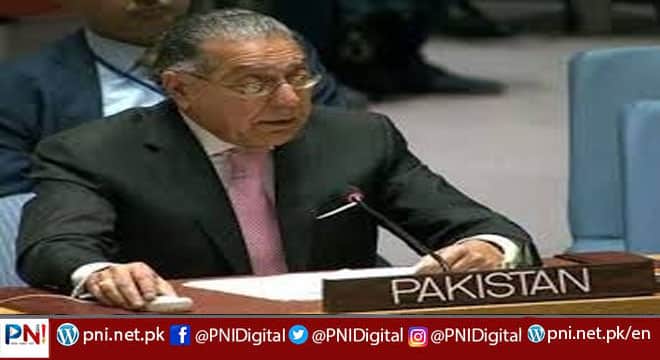UNITED NATIONS, Oct 06 (APP):A top Pakistani diplomat Wednesday called for ensuring vaccine equity to defeat the coronavirus pandemic globally, as he underlined the fact that while developed countries have vaccinated most of their population, the developing countries only less than 5 percent of their people.
“The pandemic has illustrated the oneness of humanity. It should have evoked unrestrained solidarity. Instead, advanced nations appear to have reverted to tribal instincts,” Ambassador Munir Akram told the General Assembly Second Committee, which deals with economic and social issues.
Noting that this year marked the Decade of Action to implement the 2030 Agenda, the Pakistani envoy, who was speaking in a general debate, said that the basis of the present trend lines, it would not be possible to achieve most of the SDGs (Sustainable Development goals) by 2030.
In this context, he said Pakistan welcomes Chinese President Xi Jinping’s Global Development Initiative, with the hope that both developing and industrial countries will join together within the framework of this important Initiative to advance the SDGs and promote a common future of prosperity for all nations and peoples.
Prime Minister Imran Khan, Ambassador Akram said, has also outlined a Plan of Action to ensure the implementation of the 2030 Agenda.
Elaborating, he said that the Pakistani leader’s proposals, besides vaccine equity, also called for lifting the unsustainable debt burden on developing countries by further extension of the G-20 (rich countries) Debt Service Suspension Initiative (DSSI) ; participation of the private sector in debt restructuring; debt cancellation and suspension, especially of vulnerable least developed and African countries and the SIDs (Small Island Developing countries).
In this regard, Ambassador Akram said the proposals suggested the establishment of a Global Debt Authority and an independent rating agency, with UN mandated at least to rate the companies.
Significantly larger concessional assistance should be mobilized for developing countries, especially by meeting the 0.7 GNI (Gross National Income) commitments by donor countries, he said.
While welcoming the creation of $650 billion in new Special Drawing Rights (SDRs), he said Pakistan agrees with the UN Secretary-General that this is not a “silver bullet”, and emphasized that at least $150 billion of the unutilized SDRs of richer countries should be reallocated to the developing countries.
The cost of borrowing by developing countries should be lowered through innovative financial mechanisms, such as the Liquidity and Sustainability Facility proposed by the Economic Commission for Africa, he said.
The flight of an estimated $1 trillion in resources from the developing countries each year in the form of Illicit Financial Flows (IFF) must be halted and reversed, Ambassador Akram said adding that this was a root cause of their under-development.
“We must stop these flows and secure the return of stolen assets,” he said, noting FACTI (High-Level Panel on Financial Transparency, Accountability, and Integrity) report that such a move “could enable the developing countries to eradicate poverty, reduce inequalities, build back better after the COVID crisis, address climate change and strengthen human rights”.
The Pakistani envoy also called for addressing tax havens, tax abuse, especially by multinational corporations, and other illicit financial flows through a equitable international tax regime and a universal UN intergovernmental forum to enable developing countries to generate adequate domestic revenues to finance the SDGs.
The goals and targets of the Paris Agreement on Climate Change can be fulfilled only if predictable and adequate climate finance is ensured, he said, while calling for implementing the developed countries’ pledge to provide $100 billion annually in climate finance.
Also highlighted was the need in sectors aligned with the SDGs, in particular an investment of $1 trillion annually for sustainable infrastructure, from public and private sources.
Ambassador Akram called for discarding old and new trade protectionism and establishing a fair international trading system that enables developing countries to continue to pursue export led growth.
The digital divide – the new face of the development divide – must be bridged through technology access, IT infrastructure and skills development, he said.
“Integration into the digital economy can enable developing countries to leapfrog into the modern knowledge-based global economy.”
Follow the PNI Facebook page for the latest news and updates.









